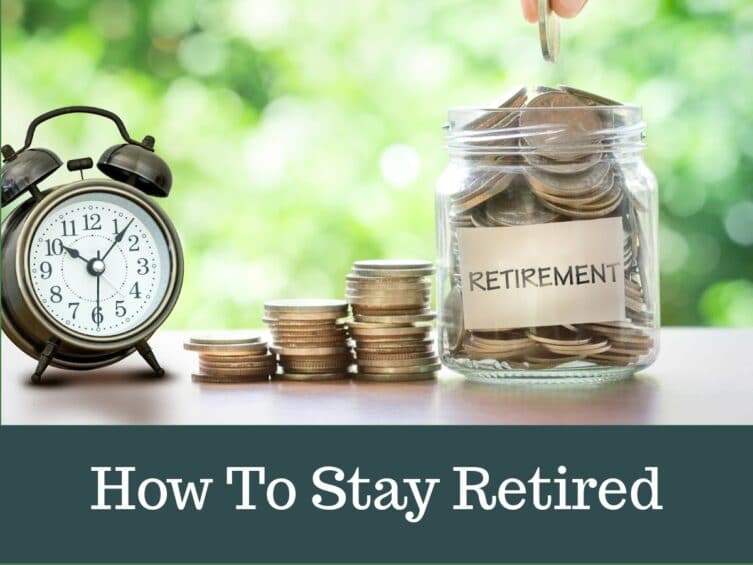Retirement should last the rest of your life.
Here are some tips on how to stay retired.
If you were to ask soon-to-be-retired Americans what they plan to do during their retirement, you’d probably get a huge range of answers: see the grandkids, travel, start a new hobby.
But if you were to ask those same people how long they would like retirement to last, you would likely get the same answer over and over again: “The rest of my life, of course!”
These are the Golden Years, and you want to spend them doing the things you enjoy at your own pace. After all, no one wants to retire and travel the world for 10 years…only to have to go back to work at the ripe old age of 75.
In short, you don’t just want to be retired, you want to stay retired!
As a financial advisor, it’s my job to help individuals and families reach their goals for retirement—whatever those goals might be—and stay there long-term, without sacrificing their lifestyle.
You Won’t “Run Out” of Money
Let me be the first to assure you that you won’t technically “run out of money” during retirement.
Because of Social Security, you’ll always have some form of income. The problem with relying solely on this form of income is that that income will be limited. The maximum amount of Social Security you can collect is around $3,000 a month, but the average is roughly half that.
If your home and other debts have been paid off and you don’t have a lot of expenses, this might be enough for you to squeak by. But I’m the Financial Quarterback™…I’m not content to just sit on the bench and watch everyone else play and I don’t want that for you, either!
Those Golden Years don’t happen by accident and people’s life spans are getting longer. In order to stay retired (and enjoy it the entire time), you’ll want to take a few steps to prepare yourself and your finances for the long haul.

Tip #1. Don’t Just Save, Invest
People—even financial experts—like to talk about “saving money,” but a savings account can only take you so far.
Even a high-yield savings account will only earn you around 1% interest (if you’re lucky). So let’s say you start with a $5,000 nest egg and your 1% interest is compounded monthly. At the end of 20 years, you’ll have a whopping…$6,000.
Is that enough to retire on?
Diversified investments have a much higher rate of return (and they aren’t always as risky as you might think). The rate of return for a diversified, balanced portfolio spread between stocks and bonds averages between 5-7% over the long-term.
Let’s put that same $5,000 into this portfolio. Even if you make no other contributions and only make 5% interest a year, you’ll have $13,000 after 20 years. Definitely not enough to retire, but this is an example about the power of compounding.
Tip #2. Start Early
If you play your cards right, even a small investment can turn into wealth with enough time.
For example, say we put $5,000 in a balanced portfolio of stocks and bonds for 40 years at 5% instead of 20. At retirement, you now have $35,000! Again, probably not enough to retire, but if you start with a solid plan of contributions and investing during your working years, it could easily be worth millions.
I’m not saying that you can’t start building wealth at age 40. (You can!) But you definitely shouldn’t waste the time you have. And if nothing else, you might consider delaying retirement by a couple years to give yourself time to catch up.

Tip #3. Max Your Contributions
When you have an income, it’s really hard not to spend it. I GET IT! But the “future you” will be so grateful that you can stay retired because “present you” prioritized post-retirement income over a flashy lifestyle.
If you can, max out your contributions to both your individual and employer-sponsored plans. For IRAs, that’s $6,000 a year ($7,000 if you’re over 50). If your employer matches any contributions to your 401k, that’s doubling your investment! Give them every dollar you can!
Tip #4. Monitor Your Assets
Planning for retirement isn’t a one-step process.
Once you figure out how much money you need to retire, you need to keep your finger on the pulse and reallocate and rebalance your accounts when necessary.
You may need to refinance your house or you might pay it off earlier than expected. You could lose your job, go back to school, even change your career entirely.
Each of these life events will have a different impact on your retirement strategy, so you’ll want to revisit your investments from time to time so you can make sure you’re doing the best you can with what you’ve got.
Continue this strategy throughout retirement, too. It will be much less jarring if you can curb your spending to make your retirement income last rather than having to suddenly go back to work.

Tip #5. Know Your Goals
I mentioned it before and it’s 100% true: everyone has different goals when it comes to retirement and it’s rare for any two people (yes, even couples!) to have the exact same expectations for their Golden Years.
Ask yourself a few questions about retirement. When do you want to retire? What lifestyle do you hope to have? Do you want to leave assets to family members or favorite charities after you’re gone?
Remember, there are no wrong answers here. The purpose of this step is to decide where you’re going so that you can make the roadmap that will get you there.
BONUS TIP: Work With a Financial Planner!
If one (or all) of these steps seem overwhelming, that’s fine. I don’t expect anyone to be an expert in all things finance.
That’s what financial planners are for.
A fiduciary knows all the ins and outs of the industry. They’re aware of all the tips, tricks, and loopholes to maximize your resources, reduce taxes, and reach your goals as efficiently as possible.
They know the answers to questions you didn’t even know you should ask!
When you consider everything that a financial advisor brings to the table, they are well worth the investment.
Want To Stay Retired?
Retirement is less about staying out of the office than it is about having the freedom to do what you want to do.
A growing number of people are finding that retirement isn’t all it’s cracked up to be and end up back in the workplace. Others love having their time all to themselves and wouldn’t change a thing. Still others may find that working part-time gives them the best of both worlds.
Whatever your idea of retirement, I can help you get and stay retired.
Remember, when it comes to building wealth, you want to start sooner rather than later. Make an appointment today so we can start making a plan to reach your retirement goals.

